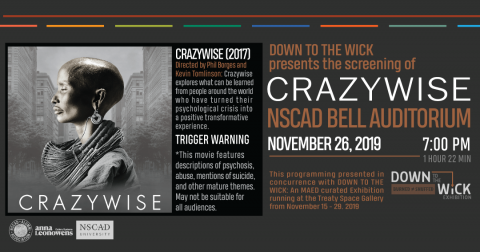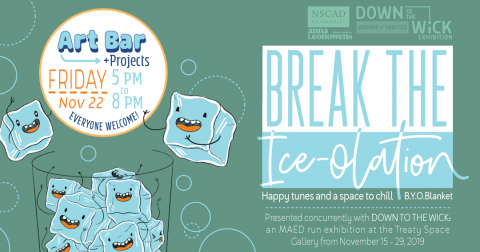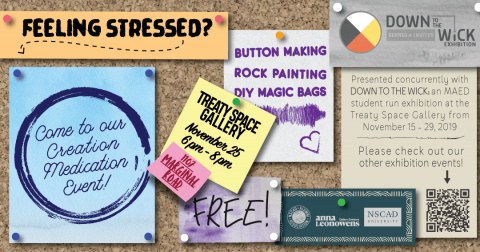Two NSCAD University students are exploring the impacts of colonization on modern day health and wellness with an all-inclusive exhibition, Down to the Wick.
Kayla Rudderham and Alexia Mitchell, both of the Master of Art in Art Education program, describe Down to the Wick as a multi-disciplinary group exhibition investigating how colonization has had an impact on the ways we cope with mental and emotional distress, and how artistic practice can help or hinder these experiences.
Down to the Wick officially opens on Friday, November 15 at NSCAD’s Treaty Space Gallery.
“This project goes way beyond expectations of a class project, and has built and nurtured partnerships with Indigenous and non-Indigenous stakeholders across the city,” said Dr. Carla Taunton, associate professor, Chair of art history and contemporary culture, and special advisor to the VP academic and research on social justice and decolonization. “They engage with two-eyed seeing as a curatorial methodology, to describe utilizing the strengths of both Indigenous and settler ways of knowing, together for the benefit of all. Through this exhibition, they have provided a forum that fosters meaning, purpose, belonging and hope among people dealing with mental health issues.”
Rudderham and Mitchell are students in Dr. Taunton’s Radical Curating class, which is where they came up with the idea and plan for Down to the Wick.
Their goal was to demonstrate that colonialism isn’t just about land and economics, but has also influenced society’s ideas of success, progress and well-being. They are using the exhibition to show that regardless of one’s culture or background, there are societal pressures relating to the constant search for progression, achievement, and even perfection.
“The pressure we put on ourselves is unhealthy and we are in need of systemic change. People are feeling overwhelmed with the amount of perceived responsibilities that are imposed on our society. This issue can lead to anxiety disorders, or depression. These issues are greatly exacerbated by factors like stigmatization and the colonial framework of mental health,” said Mitchell.
“These pressures are hard to ignore, and our main methods of escaping these troubling issues are filled with messages that not only reinforce, but amplify, the colonialist undertones of our collective communities,” added Rudderham. “Even if we wish to separate ourselves from these themes, we are left with the residual consequences that colonialism leaves in its wake. Concerns of climate change, discrimination, wars, and economic worries plague even our downtime. The result is a culture that disregards the importance of self-care, seeing it as self-indulgence, putting us all at higher risks of burnout.”
Down to the Wick goes from November 15-29, 2019 and includes a variety of exhibitions and art forms, and takes place at NSCAD’s downtown campuses. Among the events included in the project are:
- November 15, 5 p.m., Treaty Space Gallery, NSCAD Port Campus, Opening Night, featuring artists, curators, NSCAD faculty, staff and students. A smudging and opening prayer will take place.
- November 21, 7-8 p.m., Art Gallery of Nova Scotia (Gallery 5), Bring to Light panel discussion on wellness, accessibility, and the importance of bringing Indigenous and western practices together.
- November 22, 5-8 p.m., Art Bar +Projects, Break the Isolation, an opportunity to meet and converse with new people in a friendly, welcoming atmosphere.
- November 25, 6-8 p.m., NSCAD Port Campus, Creation Medication, heat bag creating, button making and rock painting.
- November 26, 7 p.m., NSCAD Bell Theatre (Fountain Campus), screening of Cazywise, a movie that explores what can be learned from people around the world who have turned their psychological crisis into a positive, transformative experience.
- November 29, 5-7 p.m., Closing Reception, Treaty Space Gallery, Port Campus.
All events during Down to the Wick are free to attend and open to the public. For more information on Down to the Wick and other NSCAD University projects and initiatives, visit nscad.ca.




